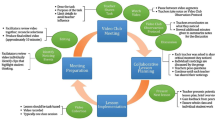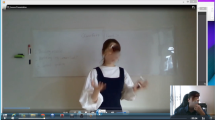Abstract
The goal of this qualitative study was to examine teacher noticing of specific interactions related to the formative assessment process during teachers' participation in an on-line video club. Nineteen teachers used an electronic video coaching platform, Edthena to view peers' videos and provide electronic feedback specific to the formative assessment process. Seven hundred and twenty-seven comments by participants were analyzed for both topics of comments related to interactive formative assessment and the type of response. The findings revealed that comments within the on-line video club focused predominantly on one aspect of formative assessment, questioning. Additionally, teachers were most comfortable validating fellow teachers' practices as opposed to providing recommendations for future practice. Implications for future use of on-line video clubs are included.


Similar content being viewed by others
Explore related subjects
Discover the latest articles and news from researchers in related subjects, suggested using machine learning.References
Arya, P., Christ, T., & Chiu, M. (2015). Links between characteristics of collaborative peer video analysis events and literacy teachers’ outcomes. Journal of Technology and Teacher Education, 23(2), 159–183 Chesapeake, VA: Society for Information Technology & Teacher Education.
Bennett, R. (2011). Formative assessment: A critical review. Assessment in Education: Principles, Policy & Practice, 18(1), 5–25.
Black, P., & Wiliam, D. (1998). Assessment and classroom learning. Assessment in Education: Principles, Policy and Practice, 5(1), 7–73.
Blosser, P. E. (2000). How to ask the right questions. Arlington: National Science Teachers Association.
Borko, H., Jacobs, J., Eiteljorg, E., & Pittman, M. (2008). Video as a tool for fostering Productive discussions in mathematics professional development. Teaching and Teacher Education, 24(2), 417–436.
Brophy, J. (2004). Using video in teacher education. Oxford: Elsevier.
di Sessa, A. A., & Minstrell, J. (1998). Cultivating conceptual change with benchmark lessons. In J. G. Greeno & S. V. Goldman (Eds.), Thinking practices in mathematics and science learning (pp. 155–187). New York: Routledge.
Ellis, J., McFadden, J., Anwar, T., & Roehrig, G. (2015). Investigating the social interactions of beginning teachers using a video annotation tool. Contemporary Issues in Technology and Teacher Education, 15(3). Retrieved from http://www.citejournal.org/vol15/iss3/general/article1.cfm .
Ferdig, R. E., Roehler, L., & Pearson, P. D. (2002). Scaffolding preservice teacher learning through web-based discussion forums: An examination of online conversations in the Reading Classroom Explorer. Journal of Computing in Teacher Education, 18(3), 87–94.
Gaudin, C., & Chalies, S. (2015). Video viewing in teacher education and professional development: A literature review. Educational Research Review, 16, 41–67.
Gotwals, A., Philhower, J., Cisterna, D., & Bennett, S. (2015). Using video to examine formative assessment practices as measures of expertise for mathematics and science teachers. International Journal of Science and Mathematics Education, 13(2), 405–423.
Harford, J., & MacRuairc, G. (2008). Engaging student teachers in meaningful reflective practice. Teaching and Teacher Education, 24, 1884–1892.
Hart, L., & Carriere, J. (2011). Developing the habits of mind for a successful lesson study community. In L. Hart, A. Alston, & A. Murata (Eds.), Lesson study research and practice in mathematics education: Learning together (pp. 27–38). New York: Springer.
Hattie, J., & Timperley, H. (2007). The power of feedback. Review of Educational Research, 77, 81–112.
Heritage, M. (2014). Formative assessment in practice: A process of inquiry and action. Cambridge: Harvard Education Press.
Koc, Y., Peker, D., & Osmanoglu, A. (2009). Supporting teacher professional development through online video case study discussions: An assemblage of preservice and inservice teachers and the case teacher. Teaching and Teacher Education, 25, 1158–1168.
Kohler, F., Henning, J. E., & Usma-Wilches, J. (2008). Preparing preservice teachers to make instructional decisions: an examination of data from the teacher work sample. Teaching and Teacher Education, 24(8), 2108–2117.
Liu, M. (2012). Discussing teaching videocases online: Perspectives of preservice and inservice EFL teachers in Taiwan. Computers & Education, 59, 120–133.
Martin, C., Sexton, T., Franklin, J., & Gerlovich. (2005). Teaching science for all children: An inquiry approach. Boston: Allyn & Bacon.
Martino, A. & Maher, C. (1999). Teacher questioning to promote justification and generalization in mathematics: what research practice has taught us. Journal of Mathematical Behavior, 18(1), 53–78.
Marzano, R. J. (2007). The art and science of teaching: A comprehensive framework for effective instruction. Alexandria: Association for Supervision and Curriculum Development.
Meyer, K. A. (2007). Student perceptions of face-to-face and online discussions: The advantage goes to …. Journal of Asynchronous Learning Networks, 11(4), 53–69.
Miller, M. (2009). Talking about our troubles: Using video-based dialogue to build preservice teachers’ professional knowledge. The Teacher Educator, 44, 143–163.
Sadler, D. R. (1989). Formative assessment and the design of instructional systems. Instructional Science, 18, 119–144.
Sato, M., Wei, R. C., & Darling-Hammond, L. (2008). Improving teachers’ assessment practices through professional development: The case of National Board Certification. American Educational Research Journal, 45(3), 669–700.
Sherin, M. G. (2007). The development of teachers’ professional vision in video clubs. In R. Goldman, R. Pea, B. Barron, & S. Derry (Eds.), Video research in the learning sciences (pp. 383–395). Mahwah: Erlbaum.
Sherin, M. G., & van Es, E. A. (2005). Using video to support teachers’ ability to notice classroom interactions. Journal of Technology and Teacher Education, 13(3), 475–491.
Sherin, M. G., & van Es, E. A. (2009). Effects of video club participation on teachers’ professional vision. Journal of Teacher Education, 60(1), 20–37.
Stockero, S. L. (2008). Differences in preservice mathematics teachers’ reflective abilities attributable to use of a video case curriculum. Journal of Technology and Teacher Education, 16, 433–458.
Strauss, A. L., & Corbin, J. M. (1990). Basics of qualitative research: grounded theory procedures and techniques. Newbury Park: Sage.
Talanquer, V., Bolger, M., & Tomanek, D. (2015). Exploring prospective teachers’ assessment practices: Noticing and interpreting student understanding in the assessment of written work. Journal of Research in Science Teaching, 52(5), 585–609.
van Es, E. A., & Sherin, M. G. (2008). Mathematics teachers’ “learning to notice” in the context of a video club. Teaching and Teacher Education, 24, 244–276.
Webb, M., & Jones, J. (2009). Exploring tensions in developing assessment for learning. Assessment in Education, 16, 165–184.
Author information
Authors and Affiliations
Corresponding author
Rights and permissions
About this article
Cite this article
Lebak, K. Analyzing on-line video club discussions focused on formative assessment. Educ Inf Technol 23, 1789–1804 (2018). https://doi.org/10.1007/s10639-018-9689-3
Received:
Accepted:
Published:
Issue Date:
DOI: https://doi.org/10.1007/s10639-018-9689-3




